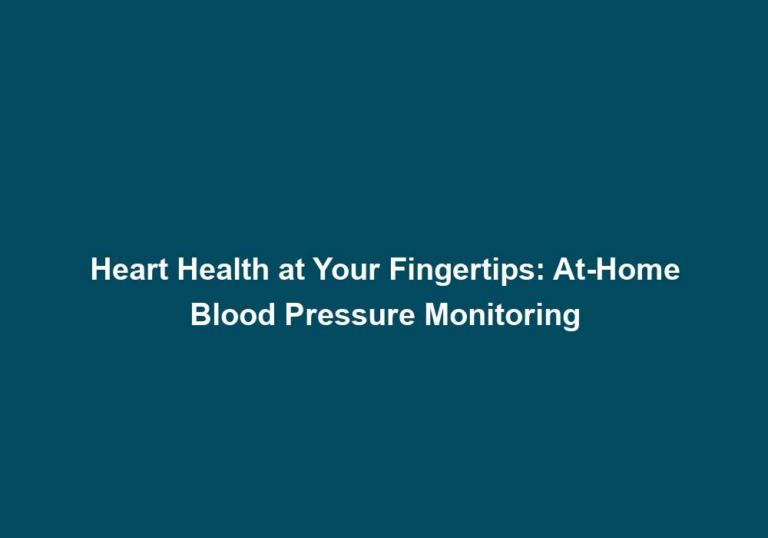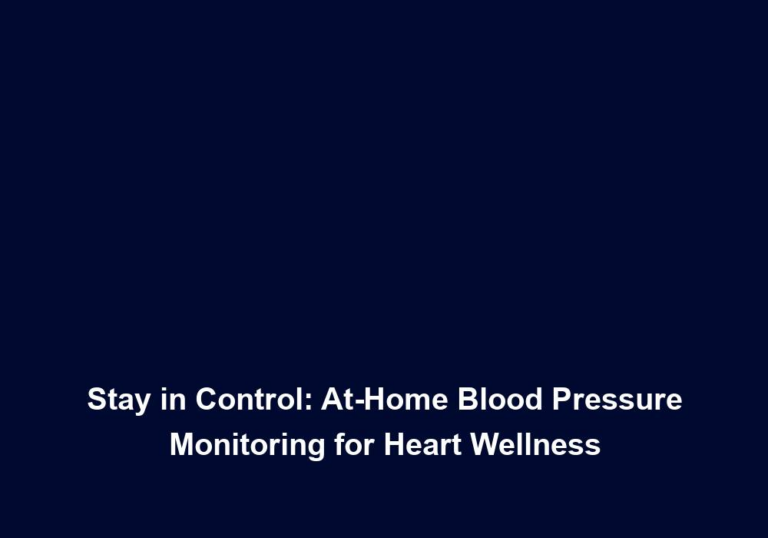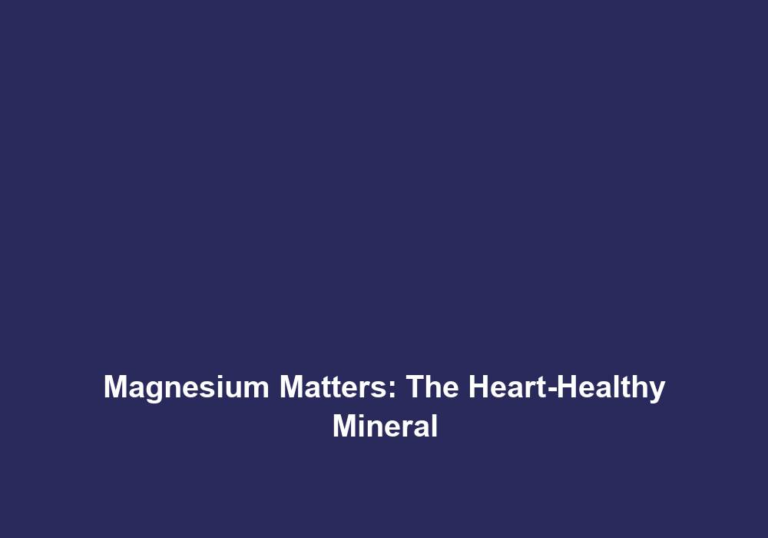Dive into Wellness: Embracing Omega-3s for a Healthier Life
Omega-3 fatty acids have gained significant attention in recent years due to their numerous health benefits. These essential fatty acids are vital for our overall well-being and can be obtained through dietary sources or supplements. In this article, we will delve into the world of Omega-3s, exploring their benefits, sources, and the impact they have on our health.
Understanding Omega-3 Fatty Acids
Omega-3 fatty acids are a type of polyunsaturated fat that our bodies cannot produce naturally. They are comprised of three main types: eicosapentaenoic acid (EPA), docosahexaenoic acid (DHA), and alpha-linolenic acid (ALA).
EPA and DHA are primarily found in fatty fish such as salmon, mackerel, and sardines. These types of fish are rich in omega-3s and provide the most bioavailable forms of EPA and DHA. Consuming EPA and DHA directly from fish sources allows our bodies to immediately reap the benefits of these essential fatty acids. On the other hand, ALA is commonly found in plant-based sources like flaxseeds, chia seeds, and walnuts. However, it’s important to note that ALA needs to be converted into EPA and DHA to be fully utilized by the body. This conversion process is not very efficient, and only a small percentage of ALA is actually converted. Therefore, it is beneficial to consume EPA and DHA directly from fish sources whenever possible.
The Health Benefits of Omega-3s
-
Promotes Heart Health: Omega-3 fatty acids are renowned for their ability to support cardiovascular health. They can help reduce triglyceride levels, lower blood pressure, decrease the risk of blood clots, and improve overall heart function. EPA and DHA have been shown to reduce inflammation, which is a major contributor to heart disease. These fatty acids also help to maintain the elasticity of blood vessels, promoting healthy blood flow and preventing the formation of plaque in the arteries.
-
Supports Brain Function: DHA, a crucial component of omega-3s, plays a vital role in brain development and function. It is particularly important during pregnancy and early childhood, as it contributes to the growth and development of the fetal brain and nervous system. Omega-3s may also help reduce the risk of age-related cognitive decline, such as Alzheimer’s disease, and promote mental well-being. DHA is found in high concentrations in the brain and is essential for the proper functioning of neurons, neurotransmitters, and cell membranes.
-
Reduces Inflammation: Chronic inflammation is associated with various diseases such as arthritis, diabetes, and certain types of cancer. Omega-3s have anti-inflammatory properties that can help alleviate symptoms and reduce the risk of developing these conditions. EPA and DHA have been shown to inhibit the production of inflammatory molecules in the body, reducing swelling and pain associated with inflammation. By incorporating omega-3s into your diet, you can help modulate the body’s inflammatory response and promote overall health and well-being.
-
Improves Eye Health: DHA is a major structural component of the retina, the part of the eye responsible for vision. Consuming sufficient amounts of omega-3s may help prevent age-related macular degeneration, a leading cause of vision loss in older adults. DHA helps to maintain the integrity of the retina and supports the proper functioning of photoreceptor cells. Including omega-3-rich foods in your diet can help protect your eyes and maintain good vision as you age.
-
Boosts Mood and Mental Health: Omega-3s have been found to play a role in regulating neurotransmitters in the brain, which can positively impact mood and mental well-being. They may help reduce symptoms of depression, anxiety, and bipolar disorder. EPA and DHA help to support the production and function of neurotransmitters, such as serotonin and dopamine, which are important for mood regulation. By incorporating omega-3s into your diet, you can support a healthy mental state and improve overall emotional well-being.
Getting Your Daily Dose of Omega-3s
-
Fatty Fish: Including fatty fish in your diet at least twice a week is an excellent way to increase your intake of EPA and DHA. Opt for varieties like salmon, trout, mackerel, and sardines. These types of fish are not only delicious but also provide a concentrated source of omega-3 fatty acids. Be mindful of the source of the fish to ensure its quality and avoid fish that may contain high levels of mercury or other contaminants.
-
Plant-Based Sources: For those following a vegetarian or vegan lifestyle, incorporating ALA-rich foods into your diet is essential. Flaxseeds, chia seeds, hemp seeds, and walnuts are excellent sources of ALA. While ALA needs to be converted into EPA and DHA, consuming these plant-based sources can still contribute to your overall omega-3 intake. Additionally, these foods provide other beneficial nutrients such as fiber and antioxidants, which support overall health.
-
Omega-3 Supplements: If it’s challenging to obtain sufficient amounts of omega-3s through diet alone, supplements can provide a convenient solution. Fish oil and algae-based supplements are popular options. Fish oil supplements typically contain EPA and DHA derived from fish sources, while algae-based supplements provide a vegetarian and sustainable source of omega-3s. When choosing supplements, look for products that are third-party tested for purity and quality.
-
Fortified Foods: Some food products, such as certain brands of eggs, milk, and yogurt, are fortified with omega-3 fatty acids. These can be an additional source of these essential nutrients. However, it’s important to read labels and choose fortified foods that use high-quality sources of omega-3s. Pay attention to the serving size to ensure you are getting an adequate amount of omega-3s from these fortified products.
Tips for Incorporating Omega-3s into Your Diet
-
Add Flaxseeds to Your Meals: Sprinkle ground flaxseeds onto your morning cereal, yogurt, or smoothie for a nutritional boost. Flaxseeds are a rich source of ALA, and by grinding them, you make it easier for your body to absorb the nutrients.
-
Enjoy Chia Pudding: Chia seeds can be soaked in milk or yogurt to create a delicious and nutritious pudding. This is a great way to incorporate omega-3s into your diet, as chia seeds are rich in ALA. Top it off with berries or nuts for added flavor and texture.
-
Choose Omega-3 Eggs: Opt for eggs that are naturally high in omega-3s or those that have been enriched with these fatty acids. Omega-3 eggs are produced by feeding hens a diet rich in flaxseeds or algae, resulting in eggs with higher levels of EPA and DHA.
-
Prepare Fish-Based Meals: Experiment with various fish recipes to make meals that are not only delicious but also packed with beneficial omega-3s. Grilled salmon, baked trout, or sardine salads are just a few examples of how you can incorporate fatty fish into your diet. Get creative with seasonings and marinades to add flavor and variety to your meals.
-
Consider Supplementation: Consult with your healthcare provider to determine if omega-3 supplements are suitable for you, especially if you have specific health concerns or dietary restrictions. They can provide guidance on the appropriate dosage and help you choose supplements that are safe and effective. Keep in mind that supplements should not replace a balanced diet but rather complement it when necessary.
Conclusion
Embracing Omega-3s in your diet is a proactive step towards achieving a healthier life. From promoting heart health to supporting brain function and reducing inflammation, these essential fatty acids offer a wide array of benefits. By incorporating fatty fish, plant-based sources, or supplements into your daily routine, you can ensure that you are giving your body the omega-3s it needs to thrive. Prioritize your well-being and dive into the world of wellness with omega-3s!







